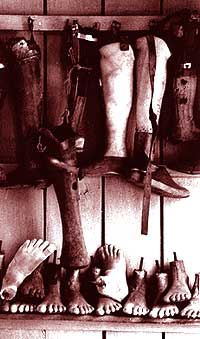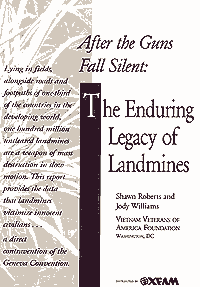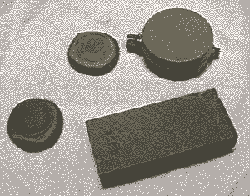| Book Review Archive 08.09.02 [48] |
|
||||
|

by Jody Williams and Shawn Roberts
Mines have been buried in Afghanistan, Iraq, Kuwait, Cambodia, Vietnam,
Angola, Mozambique, Croatia, Bosnia and many others. As a conscious policy,
few forces kept maps and in the confused fighting, minefields were laid
over minefields. Mine laying trucks can scatter 1,000 mines per minute.
In Afghanistan, Russian jets dropped mines from the air. When refugees return,
unaware of which areas are mined, injury and death rates go up. Increased
pressure on the remaining cultural land forces desertification. Agricultural
land and water supplies as well as paths and roads are often mined, as a
form of economic warfare against peasant farmers.
"In Northern Iraq, rural children commonly use mines as wheels for toy trucks and go-carts; in Cambodia they play boules with B40 anti-personnel mines.
In Afghanistan, they compete in throwing stones at PFM-1 'Butterfly' mines,
the winner being the child whose stone causes the mine to detonate" [page
10]
In Cambodia, there is a kind of dangerous mine black economy, where farmers
are paid $4 per hectare for clearing them. The fields are burned, then prodded
with hoes. Mines are lifted and resold to the military. There is an illicit
trade in dismantling them, the explosives are used for hunting or fishing,
their scrap metal sold.
This book was written before the ban on landmines. UN agencies do not have
the funding to clear the mines, and in many places the fighting still goes
on. Prior to the ban, 100 companies in 55 countries were manufacturing 5
million mines per year. Big business. One of the major faults with this
book is that despite its copious tables of injuries, hospital statistics,
costs to Third World agriculture, losses of goats, donkeys, camels; these
coy bureaucrats give little to no information about who the companies are,
and the identities of the individuals responsible for this. Watch out for
the thirteenth pillar...
|
|||
|
BLUE is looking for short fiction, extracts of novels, poetry, lyrics,
polemics, opinions, eyewitness accounts, news, features, information and arts
in any form relating to eco cultural- social- spiritual issues, events and
activites (creative and political). Send to Newsdesk. |



 Green Anarchist:
Green Anarchist: